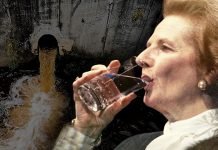Greenpeace says demand for soybeans that are used to make poultry feed is helping to drive destruction of South American forests.
British consumers swapping red meat for chicken as part of a greener lifestyle may be unwittingly contributing to the razing of rainforests, Greenpeace said.
With sales of chicken rising in Britain, the environmental pressure group warned of the hidden climate impact of raising the birds, whose feed is mainly grown in South America.
That, says Greenpeace, means rising consumption could further endanger the rainforests, which are already shrinking by millions of hectares each year.
“I really don’t think consumers are aware of this link to the extent they should be,” said Chiara Vitali, the lead author of the report.
“The message that has been coming across so far is that we need to be cutting red meat so it’s OK to switch to something like chicken and unfortunately that is not the case,” she added, urging consumers instead to eat more plant-based food.
Over the past 20 years demand for beef, lamb and pork has fallen sharply in Britain, according to Greenpeace analysis of official household purchase data, but that has been offset by a 20 per cent increase in consumption of chicken.
A survey by Leatherhead Food Research published in September found consumers are buying less red meat due to concerns over health and the impact on the climate.
The message that has been coming across so far is that we need to be cutting red meat so it’s OK to switch to something like chicken and unfortunately that is not the case.
Chiara Vitali, campaigner, Greenpeace UK
But Greenpeace said demand for the soybeans that are used to make poultry feed was helping to drive destruction of South American forests that act as carbon sinks.
A survey of 23 leading British supermarkets, fast-food restaurants and food companies found none were tracking whether soy used for animal feed in their supply chains was linked to deforestation, it said.
About 68 per cent of Britain’s soy imports come from South America, according to data from a government-led initiative to encourage sustainable soy. About 90 per cent of the soy the European Union imports is used to feed livestock.
British shops were working to combat deforestation and increase the use of certified sustainable soy in supply chains, said the British Retail Consortium in response to the report.
UKHospitality, the industry group that represents restaurants and cafes, was not available for comment.
George Monbiot explaining what we need to do to address climate change on Frankie Boyle’s New World Order 11th April 2019.
Global Canopy, an environmental group that works with companies to halt deforestation, has said the loss of tropical forests creates an estimated 8 per cent of all greenhouse gas emissions.
Sarah Rogerson, a researcher at Global Canopy’s Forest 500 initiative to rate leading firms on their action on deforestation, said the Greenpeace report underscored the failure of many businesses to be transparent about sourcing.
“Quite a lot of companies have made commitments, but our evidence suggests that very few are actually providing enough transparency about what they are doing,” she told the Thomson Reuters Foundation.
“The picture is even worse for indirect soy in animal feed, manufacturers and retailers often have commitments or report only on the soy that ends up directly in their products, so they are not looking at the deforestation risk in the animal feed.”
This story was published with permission from Thomson Reuters Foundation, the charitable arm of Thomson Reuters, that covers humanitarian news, climate change, resilience, women’s rights, trafficking and property rights. Visit http://news.trust.org/climate.
Help Us Sustain Ad-Free Journalism
Sorry, I Need To Put Out the Begging Bowl
Independent Journalism Needs You
Our unwavering dedication is to provide you with unbiased news, diverse perspectives, and insightful opinions. We're on a mission to ensure that those in positions of power are held accountable for their actions, but we can't do it alone. Labour Heartlands is primarily funded by me, Paul Knaggs, and by the generous contributions of readers like you. Your donations keep us going and help us uphold the principles of independent journalism. Join us in our quest for truth, transparency, and accountability – donate today and be a part of our mission!
Like everyone else, we're facing challenges, and we need your help to stay online and continue providing crucial journalism. Every contribution, no matter how small, goes a long way in helping us thrive. By becoming one of our donors, you become a vital part of our mission to uncover the truth and uphold the values of democracy.
While we maintain our independence from political affiliations, we stand united against corruption, injustice, and the erosion of free speech, truth, and democracy. We believe in the power of accurate information in a democracy, and we consider facts non-negotiable.
Your support, no matter the amount, can make a significant impact. Together, we can make a difference and continue our journey toward a more informed and just society.
Thank you for supporting Labour Heartlands












